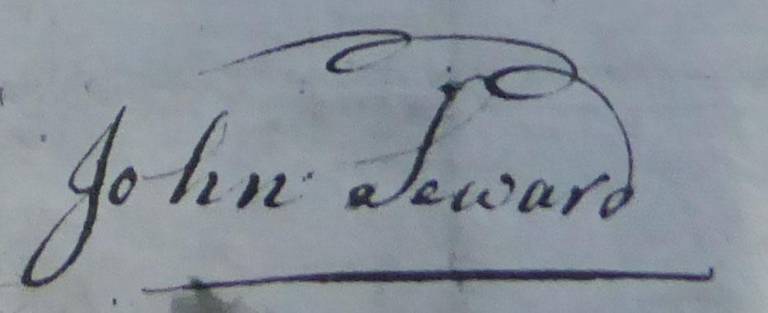
I have a news story to speak of in this column, and this is related to history.
Here’s some background first. I have published five books over the years and currently have one that is finished and edited and for which I am looking for a publisher. It is call “Ogden: The Honest Lawyer.”
Another in process is on my grandfather’s journey from Cornwall, England, to the hard-rock mining of America.
Another manuscript is on Lewis Morris, signer of the Declaration of Independence, and another is on Seward (“Seward & Brant in the Battle of the Minisink”).
The Ogden, Morris and Seward treatises are based on the true history of men from Sussex County - the Wallkill Valley area in particular - during the Revolutionary War time.
It has been a lot of work, and what I call fun, developing these stories. But much research is necessary to glean the history from long ago.
On all three remarkable men, there’s not much information available to gather, believe me.
John Seward was a veteran of the war, having been under Lord Stirling, who owned the Sterling Hill Mine in Ogdensburg. Seward was a seasoned warrior, taking part in the Battle of Brooklyn, fighting with General Washington up Manhattan and White Plains, and being stationed near Philadelphia.
He lived on Snufftown Mountain, which is today’s Stockholm in Sussex County.
One of his sons went to Columbia University, became a doctor and lived in Florida, N.Y. His son, William Henry Seward, became governor of New York and was Abraham Lincoln’s secretary of state (along with the purchasing Alaska and gaining the lasting endorsement of “Seward’s Folly”).
But, there is not much detail on the colonel at all.
A descendant of Seward is a professor at Minnesota State University: Leah Rogne. Along with Jeff Stovken, we showed her the old Seward land and dam a few years ago. Through her, and then the University of Rochester Library, I discovered the treasure trove of real letters, still existing, written by Colonel Seward!
I was amazed that wartime letters from a local hero from our little hamlet of Snufftown still existed. These are precious personal letters from the battlefield and campgrounds written during the Revolutionary War. What a find!
There are 13 letters in all. They were written on parchment paper, ragged and dirty now, with some smears and stains and many jagged edges. Still, the print is legible and the letters quite well-written.
Colonel Seward had an artistic hand. I can see it now, him sitting in a campground tent with the dim glow of dusk surrounding him as he takes a goose quill and dips it into a small pot of valuable ink. After a pensive gaze to the roof of canvas, he takes this tool into his soft fist and scribes some words.
His penmanship is extraordinarily smooth and readable. Any of my many English teachers would have given him an A on his script (not so for me), and this for a man whom I had thought had no formal education.
His letters are consistent and sober, they follow an order and are both factual and some parts written as humanely affectionate. He begins each with headlines like a journalist would.
First is his location, be it “Wol Streat” (Wall Street) New York or Fort Washington or White Plains. There is one from Morristown and one from Pompton Plains. They span the time from June 1776 through November 1777.
In many of the letters he lucidly appreciates his life - he thanks God for his health. He assures his wife of being her “husband until death.”
Here’s an excerpt from July 12, 1776. This is a time when the Patriots were preparing for the Battle of Brooklyn and within two months would need to retreat up through Manhattan, Fort Washington and into White Plains. This is taken verbatim, along with misspellings.
New York July the 12: 1776
My dear I take this opportunity to inform you that I am in reasonable health at present. Blessed be God for the same. I have nothing to inform you. The fleat lies off on Staton Island shore the sity be full of solgers. The inhabitants chiefly gone into the country. The solgers all in good spirits I do not expect any ingagement soon. My dear I have heard from you several times by the word of mouth you did not wright which I have something strange I should be glad to see you my dear and I did expect you would have sent me a hors before this time if you had I should have been home to see you. If you I have send litel John send him to the God wind. His son will be good a nuf to come down with him and he can find where we live in the city. So I give my kind love to you my dear a love all my kind love to my son Obadiah. Hi love and Elisabeth and the three littel sons Johnne Samuel and Jebreal. I hope the all mighty will direct you all. So no more all present. But I remaine your loving father till death. John Seward
Bill Truran, Sussex County Historian